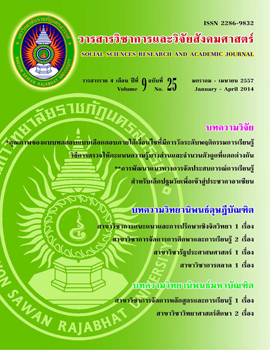กลยุทธ์การสื่อสารการตลาดภายในเพื่อเสริมสร้างความไว้วางใจ และความผูกพันในตราโรงแรม
Main Article Content
Abstract
บทคัดย่อ
การศึกษาวิจัยครั้งนี้มีวัตถุประสงค์ดังนี้ 1) เพื่อศึกษาองค์ประกอบสำคัญของระบบการสื่อสารการตลาดภายในโรงแรม (Internal marketing communication) ความมั่นใจในความสามารถของตน (Self efficacy) ความไว้วางใจ (Trust) และความผูกพัน (Commitment) ของพนักงานที่มีต่อตราโรงแรม 2) เพื่อวิเคราะห์ความสัมพันธ์ของการสื่อสารการตลาดภายใน และความเชื่อมั่นในความสามารถของตน ที่มีผลให้พนักงานเกิดความไว้วางใจและผูกพันกับตราโรงแรม 3) เพื่อกำหนดรูปแบบกลยุทธ์การสื่อสารการตลาดภายในที่มีประสิทธิผลต่อโรงแรมในการสร้างให้พนักงานมีความไว้วางใจและผูกพันกับตราโรงแรม กลุ่มตัวอย่างที่ใช้ศึกษา คือ พนักงานโรงแรม จำนวน 1,001 คน ในจังหวัดเชียงใหม่ ซึ่งเป็นจังหวัดที่มีการขยายตัวของธุรกิจโรงแรมค่อนข้างสูง และเป็นจังหวัดที่มีอัตราการขยายตัวของนักท่องเที่ยวมากขึ้น การเก็บรวบรวมข้อมูลดำเนินการระหว่างเดือนตุลาคม – พฤศจิกายน 2555 วิเคราะห์ข้อมูลโดย การแจกแจงความถี่ ค่าร้อยละ ค่าสถิติไค-สแควร์ และโมเดลสมการโครงสร้าง (Structural Equation Model)
ผลการวิจัย พบว่า
กลยุทธ์การสื่อสารการตลาดภายใน เพื่อเสริมสร้างความไว้วางใจ และความผูกพันในตราโรงแรม ที่พัฒนาขึ้นมีความเหมาะสม อันเนื่องจากตัวแบบที่พัฒนาขึ้น มีความสอดคล้องกับข้อมูลเชิงประจักษ์ เนื่องจากการทดสอบค่าไคว์ สแควร์ (Chi-square) ไม่มีนัยสำคัญทางสถิติที่ระดับ 0.05 (P≥0.05) ค่าดัชนีทุกตัวได้แก่ GFI, AGFI, NFI, IFI, CFI ผ่านเกณฑ์ที่กำหนดตั้งแต่ 0.90 ขึ้นไป ส่วนดัชนีที่กำหนดไว้ที่ระดับน้อยกว่า 0.05 พบว่า ดัชนี RMR, RMSEA ผ่านเกณฑ์ที่กำหนดไว้เช่นเดียวกัน นอกจากนั้นดัชนี CMIN/df น้อยกว่า 2 ผ่านเกณฑ์ที่กำหนดไว้เช่นเดียวกัน อีกทั้งในแต่ละองค์ประกอบของแบบจำลองมีความเที่ยงตรง (Validity) เนื่องจากมีค่าน้ำหนักปัจจัย (Factor loading) มีค่าตั้งแต่ 0.30 ขึ้นไป นั่นแสดงถึงผลการศึกษาสามารถนำไปประยุกต์ใช้เพื่อพัฒนาโรงแรมและใช้ในการเพิ่มประสิทธิภาพการบริหารการตลาดของโรงแรมโดยผู้บริหารหรือผู้ประกอบการต้องมีการสร้างให้พนักงานมีความไว้วางใจและมีความผูกพันกับตราโรงแรมก่อน โดยผ่านกลยุทธ์การสื่อสารการตลาดภายในร่วมกับการเสริมสร้างให้พนักงานมีความมั่นใจในความสามารถของตน
Abstracts
The objectives of this study were to 1) study the important elements of internal marketing communication systems, the self-efficacy, the trust, and the commitment which the employees have towards the hotel branding, 2) analyze the relationship of internal marketing communication and the confidence in self-efficacy which have effects on the employees’ trust and the commitment on the hotel branding and 3) set up a strategic format for internal marketing communication which have effects on the hotel and build employees’ trust and commitment on the hotel branding. The subjects were 1,001 hotel employees in Chiang Mai which is a city with the high expansion of hotel business as well as a city with the high growth rate of tourists. The period of study was from October to November 2012. The statistics used to analyze the data were frequency, percentage, chi-square and the structural equation model.
It was found that the improved strategy used for internal marketing communication to enhance trust and commitment on the hotel branding was suitable due to the model was in accordance with the evident data. This is because the test of chi-square had no statistical significance at 0.05 (P ≥ 0.05) The values of all indexes like GFI, AGFI, NFI, IFI and CFI were higher than the criteria of 0.90. For the values of the indexes set lower than 0.05, RMR and RMSEA also were within the criteria. In addition, the index CMIN/df which was lower than 2 was within the criteria too. Moreover, each element of the model had validity since the value of factor loading was from 0.30 up. This means that the results of the study can be applied to develop the hotel and enhance the proficiency of marketing administration by the administrator or the entrepreneurs should first enhance employees’ trust and commitment to the hotel by using the strategic internal marketing communication to build up employees’ confidence.


